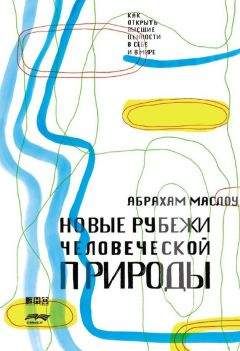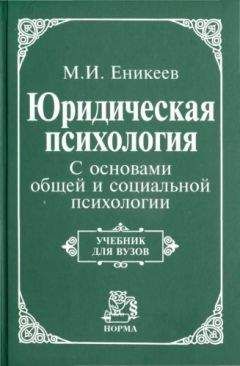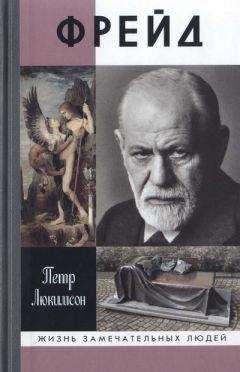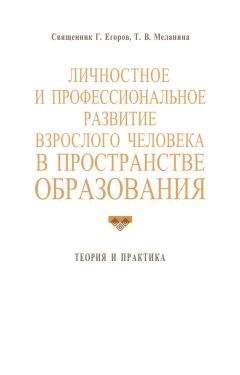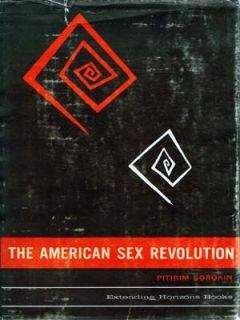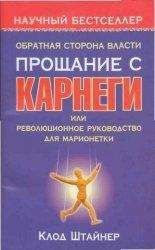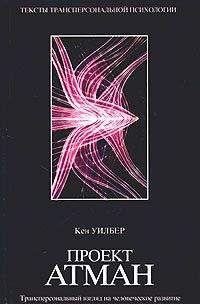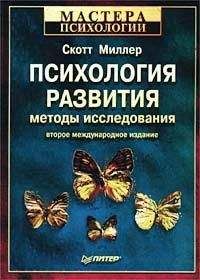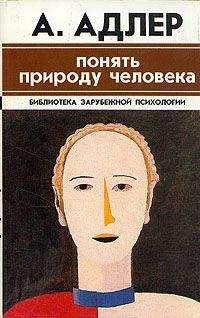Марк Хаузер - Мораль и разум. Как природа создавала наше универсальное чувство добра и зла
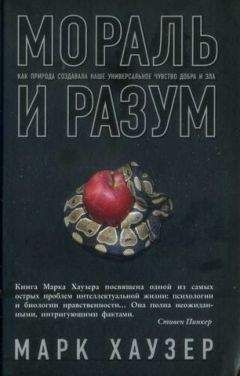
Скачивание начинается... Если скачивание не началось автоматически, пожалуйста нажмите на эту ссылку.
Жалоба
Напишите нам, и мы в срочном порядке примем меры.
Описание книги "Мораль и разум. Как природа создавала наше универсальное чувство добра и зла"
Описание и краткое содержание "Мораль и разум. Как природа создавала наше универсальное чувство добра и зла" читать бесплатно онлайн.
В книге известного американского ученого Марка Хаузера утверждается, что люди обладают врожденным моральным инстинктом, действующим независимо от их пола, образования и вероисповедания. Благодаря этому инстинкту, они могут быстро и неосознанно выносить суждения о добре и зле. Доказывая эту мысль, автор привлекает многочисленные материалы философии, лингвистики, психологии, экономики, социальной антропологии и приматологии, дает подробное объяснение природы человеческой морали, ее единства и источников вариативности, прослеживает пути ее развития и возможной эволюции. Книга имела большой научный и общественный резонанс в США и других странах. Перевод с английского Т. М. Марютиной Научный редактор перевода Ю. И. Александров
Abu-Odeh L. (1997). Comparatively speaking: the “honor” of the “east” and the “passion” of the “west” // Utah Law Review, 281, 287—307.
Adolphs R. (2003). Cognitive neuroscience of human social behavior // Nature Neuroscience Reviews, 4, 165—178.
Adolphs R., Tranel D. & DamasioA. (1998). The human amygdala in social judgment // Nature, 393, 470—474.
Ainslie G. (2000). Break-Down of Will. New York: Cambridge University Press.
Alexander R. D. (1987). The Biology of Moral Systems. New York: Aldine de Gruyter.
Allport G. W (1954). The Nature of Prejudice. Cambridge: Addison-Wesley.
Almor A. & Sloman S. (1996). Is deontic reasoning special // Psychological Review, 103, 374—380.
Altmann J. (1980). Baboon Mothers and Infants. Cambridge, MA: Harvard University Press.
Anderson J. R., Myowa-Yamakoshi M. & Matsuzawa T (2004). Contagious yawning in chimpanzees // Proceedings of the Royal Society, London, Biology Letters, 4, SI—S3.
Anderson S. R. & Lightfoot D. (2000). The human language faculty as an organ // Annual Review of Physiology, 62, 697—722.
Anderson S. W., Bechara A., Damasio FI., Tranel D. & Damasio A. R. (1999). Impairment of social and moral behavior related to early damage in human prefrontal cortex // Nature Neuroscience, 2, 1032—1037.
Aureli F. bade Waal F. В. M. (2000). Natural Conflict Resolution. Berkeley: University of California Press.
Austen J. (1814). Mansfield Park. New York: Oxford University Press.
Axelrod R. (1984). The Evolution of Cooperation. New York: Basic Books.
Ayduk O., Downey G., Testa A., Yen Y & Shoda Y. (1999). Does rejection elicit hostility in high rejection sensitive women? // Social Cognition, 17, 245—271.
Ayduk O., Mendoza-Denton R., Mischel W., Downey G., Peake P. K. & Rodriguez M. L. (2000). Regulating the interpersonal self: strategic self-regulation for coping with rejection sensitivity // Journal of Personality and Social Psychology, 79, 776—792.
Baird J. A. ScAstington J. W. (2004). The role of mental state understanding in the development of moral cognition and moral action // New Directions for Child and Adolescent Development, 103, 37—49.
Baird R. M. & Rosenbaum S. E. (2001). The Ethics of Abortion: Pro-Life vs ProChoice. New York: Prometheus Books.
Baker M. C. (2001). The Atoms of Language. New York: Basic Books.
Baldwin D. A. & Baird J. A. (2001). Discerning intentions in dynamic human action // Trends in Cognitive Science, 5, 171—178.
Bariaji M. R. (2001). Implicit attitudes can be measured // H. L. Roediger & J. S. Nairne & I. Neath & A. Surprenant (Eds.), The Nature of Remembering: Essays in Honor of Robert G. Crowder. Washington: American Psychological Association.
Baron J. (1994). Nonconsequentialist decisions // Behavioral and Brain Sciences, 17(1), 1—10.
Baron J. (1998). Judgment Misguided: Intuition and Error in Public Decision Making. Oxford: Oxford University Press.
Baron J., Granato L., Spranca M. & Teubal E. (1993). Decision making biases in children and early adolescents: exploratory studies // Merrill-Palmer Quarterly, 39, 23—47.
Baron-Cohen S. (1995). Mindblindness. Cambridge, MA: MIT Press.
Baron-Cohen S., Leslie А. M. & Frith U. (1985). Does the autistic child have a “theory of mind”? // Cognition, 21, 37—46.
Barrett L. & Henzi S. P. (2001). The utility of grooming in baboon troops // R. Noe & J. A. R. A. M. van Hoof & P Hammerstein (Eds.), Economics in Nature (p. 119—145). Cambridge: Cambridge University Press.
Barry D. (1995). Complete Guide to Guys. New York: Ballantine Book, Random House.
Bassili J. N. (1976). Temporal and spatial contingencies in the perception of social events // Journal of Personality and Social Psychology, 33, 680—685.
Bateson M. & Kaselnik A. (1997). Starlings’ preferences for predictable and unpredictable delays to food // Animal Behaviour, 53, 1129—1142.
Baumeister R. E (1999). Evil. Inside human violence and cruelty. New York: W H. Freeman.
Baumeister R. F, Stillwel A. & Heatherton T E (1994). Guilt: An interpersonal approach // Psychological Bulletin, 115, 243—267.
BecharaA., Damasio A., Damasio H. be Anderson S. W. (1994). Insensitivity to future consequences following damage to human prefrontal cortex // Cognition, 50, 7—15.
Bechara A., Damasio H., Tranel D. & Damasio A. (1997). Deciding advantageously before knowing the advantageous strategy // Science, 275, 1293—1295.
Beck A. T (1999). Prisoners of Hate: The cognitive basis of anger, hostility and violence. New York: HarperCollins.
BekoffM. (2001a). The Dolphin’s Smile. New York: Discover.
BekoffM. (2001b). Social play behaviour: cooperation, fairness, trust, and the evolution of morality //Journal of Consciousness Studies, 8, 81—90.
BekoffM. (2004). Wild justice, cooperation, and fair play: minding manners, being nice, and feeling good // R. Sussman & A. Chapman (Eds.), The Origins and Nature of Sociality (p. 53—79). Chicago: Aldine Press.
Belyaev D. K. (1979). Destabilizing selection as a factor in domestication // Journal of Heredity, 70, 301—308.
Bentham J. (1789/1948). Principles of Morals and Legislation. New York: Haffner.
Bercovitch F. B. (1988). Coalitions, cooperation and reproductive tactics among adult male baboons // Animal Behaviour, 36, 1198—1209.
Bergman T. J., Beehner J. C, Cheney D. & Seyfarth R. (2003). Hierarchical classification by rank and kinship in baboons // Science, 302, 1234—1236.
Berkowitz L. & Daniels L. R. (1964). Affecting the salience of the social responsibility norm: effects of past help on the response to dependency relationships // Journal of Abnormal and Social Psychology, 68, 275—281.
Berthoz S.,Armony J. L., Blair R. J. R. & Dolan R. J. (2002). An f MRI study of intentional and unintentional (embarrassing) violations of social norms // Brain, 125, 1696—1708.
Binmore K. G. (1998). Game theory and the social contract. II. Just Playing. Cambridge, MA: MIT Press.
Blair R. J. R. (1995). A cognitive developmental approach to morality: investigating the psychopath // Cognition, 57, 1—29.
Blair R. J. R. (1997). Moral reasoning and the child with psychopathic tendencies // Personality and Individual Differences, 22, 731—739.
Blair R. J. R. & Cipolotti L. (2000). Impaired social response reversal. A case of ‘acquired sociopathy’ // Brain, 123, 1122—1141.
Blair R. J. R., Morris J. S., Frith C. D., Perrett D. I. & Dolan R. J. (1999). Dissociable neural responses to facial expressions of sadness and anger // Brain, 122, 883— 893.
Blair R. J. R., Sellars C, Strickland /., Clark E, Williams A. О., Smith M. & Jones L. (1995). Emotion attributions in the psychopath // Personality and Individual Differences, 19, 431—437.
Boehm C. (1999). Hierarchy in the Forest: The evolution of egalitarian behavior. Cambridge, MA: Harvard University Press.
Bok S. (1978). Lying: Moral Choice in Public and Private Life. London: Quarter Books.
Bolig R., Price C. S., O'Neill P L. & Suomi S. J. (1992). Subjective assessment of reactivity level and personality traits of rhesus monkeys // International Journal of Primatology, 13, 287—306.
Bouchard T J., Lykken D. T, McGue M., Segal N. L & Tellegen A. (1990). Sources of human psychological differences: the Minnesota Study of Twins Reared Apart // Science, 250, 223—228.
Bowles S. & Gintis H. (1998). Is equality passe? Homo reciprocans and the future of egalitarian politics // Boston Review, Fall, 1—27.
Bowles S. & Gintis H. (1999). Is equality passe? Homo reciprocans and the future of egalitarian politics // Boston Review, 23, 4—35.
Bowles S. & Gintis H. (2003). The evolution of cooperation in heterogeneous populations. Unpublished manuscript, Santa Fe.
Boyd R., Gintis H., Bowles S. & Richerson P J. (2003). The evolution of altruistic punishment // Proceedings of the National Academy of Sciences, USA, 100, 3531—3535.
Boyd R. & Richerson P J. (1992). Punishment allows the evolution of cooperation (or anything else) in sizeable groups // Ethobgy and Sociobiology, 113, 171— 195.
Boyd R. & Richerson P J. (2005). The Origin and Evolution of Cultures. New York: Oxford University Press.
Brewer M. B. (1999). The psychology of prejudice: ingroup love or outgroup hate? // Journal of Social Issues, 55, 429—444.
Brosnan S. F. bade Waal F. В. M. (2003). Monkeys reject unequal pay // Nature, 425, 297—299.
Brosnan S. F., Schiff H. C. & de Waal F. В. M. (2005). Tolerance for inequity may increase with social closeness in chimpanzees // Proceedings of the Royal Society, London, B, 1560, 253—258.
Brothers L. (1997). Friday’s Footprints. New York: Oxford University Press.
Brothers L. & Ring B. (1992). A neuroethological framework for the representation of minds //Journal of Cognitive Neuroscience, 4, 107—118.
Brown D. E. (1991). Human Universals. New York: McGraw Hill.
Bshary R. (2001). The cleaner fish market // R. Noe & J. A. R. A. M. van Hoof & P Hammerstein (Eds.), Economics in Nature (p. 146—172). Cambridge: Cambridge University Press.
Butterworth B. (1999). What Counts: How every brain is hardwired for math. New York: Free Press.
Byrne R. & Whiten A. (1990). Tactical deception in primates: The 1990 database // Primate Report, 27, 1—101.
Byrne R. W. & Corp N. (2004). Neocortex size predicts deception rate in primates // Proceedings of the Royal Society, London, B, 277, 1693—1699.
Caldwell R. L. (1986). The deceptive use of reputation by stomatopods // R. W Mitchell & N. S. Thompson (Eds.), Deception: perspectives on human and nonhuman deceit (p. 129—146). New York: SUNY Press.
Call J. (2001). Chimpanzee social cognition // Trends in Cognitive Science, 5, 388— 393.
Call J., Hare B., Carpenter M. & Tomasello M. (2004a). Do chimpanzees discriminate between an individual who is unwilling to share and one who is unable to share? // Developmental Science, 4, 488—498.
CallJ., Hare B., Carpenter M. & Tomasello M. (2004b). ‘Unwilling’ versus ‘unable’: chimpanzees’ understanding of human intentional action // Developmental Science, 7, 488—498.
Call J. & Tomasello M. (1999). A nonverbal theory of mind test. The performance of children and apes // Child Development, 70, 381—395.
Caramazza A. (1998). The interpretation of semantic category-specific deficits: what do they reveal about the organization of conceptual knowledge in the brain? // Neurocase, 4, 265—272.
Caramazza A. & Shelton J. (1998). Domain-specific knowledge systems in the brain: the animate-inanimate distinction //Journal of Cognitive Neuroscience, /0,1—34.
Carey S. (1985). Conceptual Change in Childhood. Cambridge, MA: MIT Press.
Carey S. (in press). The Origins of Concepts. Cambridge, MA: MIT press.
Carlson S. M. & Moses L. J. (2001). Individual differences in inhibitory control and children’s theory of mind // Child Development, 72, 1032—1053.
Carlson S. M., Moses L. J. & Hix H. R. (1998). The role of inhibitory processes in young children’s difficulties with deception and false belief // Child Development, 69(3), 672—691.
Casati R. & Varzi A. C (1996). Events. Brookfield: Dartmouth Publishing Company.
Chalmeau R., Visalberghi E. & Galloway A. (1997). Capuchin monkeys, Cebus apella, fail to understand a cooperative task // Animal Behaviour, 54, 1215—1225.
Chandler M., Fritz A. S. & Hala S. (1989). Small scale deceit: deception as a marker of two-, three-, and four-year olds’ early theories of mind // Child Development, 60, 1263.
Подписывайтесь на наши страницы в социальных сетях.
Будьте в курсе последних книжных новинок, комментируйте, обсуждайте. Мы ждём Вас!
Похожие книги на "Мораль и разум. Как природа создавала наше универсальное чувство добра и зла"
Книги похожие на "Мораль и разум. Как природа создавала наше универсальное чувство добра и зла" читать онлайн или скачать бесплатно полные версии.
Мы рекомендуем Вам зарегистрироваться либо войти на сайт под своим именем.
Отзывы о "Марк Хаузер - Мораль и разум. Как природа создавала наше универсальное чувство добра и зла"
Отзывы читателей о книге "Мораль и разум. Как природа создавала наше универсальное чувство добра и зла", комментарии и мнения людей о произведении.





